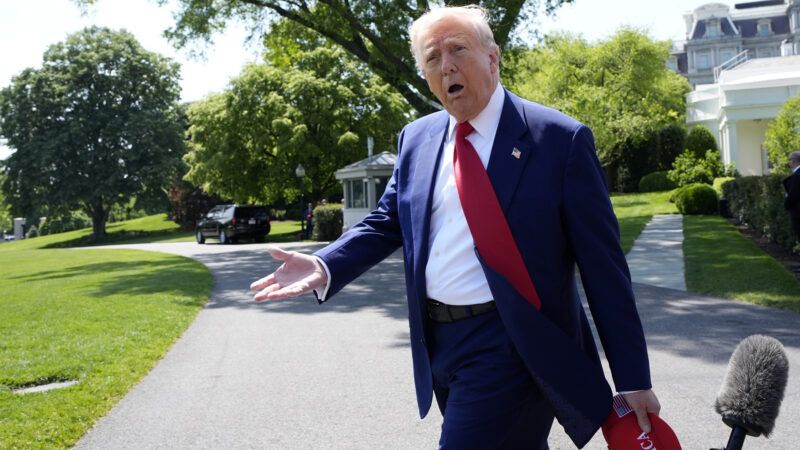Tariffs Won't Fix What's Ailing American Men in the Work Force
If anything, they sabotage the very forces—dynamism, adaptability, innovation—that create the economic opportunities struggling workers need.

When President Donald Trump reentered office in 2025, he inherited a strong economy partly fueled by the possibility of lower taxes on capital, fewer overbearing regulations, energy abundance, and the rise of artificial intelligence (AI). Instead of stewarding that prosperity and optimism, Trump quickly upended it through a reckless love affair with tariffs and a flair for insulting allies. The result is a shrinking economy and the biggest stock market drop of any early presidential administration since the Nixon era.
The fiasco is made sadder by the fact that Trump's heart appeared to be in the right place.
At the core of Trump's economic vision is sincere worry, I think, about the decline in prime-age male labor-force participation. Over the past 50 years, the percentage of 25-to-54-year-old men participating in the work force has fallen from the mid-90s to the high 80s, with an especially pronounced drop-off among less-educated men.
This has real social consequences. Men without stable employment are far less likely to marry and form lasting families, and are more vulnerable to addiction, isolation, and what economists call "deaths of despair"—suicide, drug overdoses, and alcohol-related mortality.
The connection is clear. Research shows that economic insecurity among non-college-educated men fuels declining marriage rates, weaker communities, and more public health crises. Without access to meaningful work, men struggle to build lives of stability and upward mobility.
This sad trend is rooted in problems that tariffs and industrial policy won't fix. If anything, these policies sabotage the very forces—dynamism, adaptability, innovation—that create the economic opportunities struggling workers need. They also double down on the root cause of the problem: government intervention.
Start with the big picture. Americans today are vastly better off than they were 50 years ago. After adjusting for inflation, household incomes have risen by about 50 percent—more than double what raw census data suggest. Unemployment remains near historic lows. Over the past three decades, the private service sector has created about 40.5 million net new jobs, many in high-wage, high-skill fields like health care, finance, and professional services.
Meanwhile, U.S. industrial output has surged. It's now at its all-time high but with fewer workers thanks to stunning productivity gains. As economist David Autor notes, the so-called hollowing out of the middle class involves many workers moving up into higher-skill, higher-paying occupations.
None of this means that the labor-force detachment problem should be ignored. It does mean that the story is more complicated than Trump's "China stole our jobs" narrative suggests.
Take the famous "China shock" study that pointed to up to 2.4 million American jobs displaced in particular locales, mainly in manufacturing, after China joined the World Trade Organization and ramped up exports. Many subsequent studies that accounted for jobs created elsewhere in the economy show that, at the national level, the overall job impact was neutral.
The deeper problem exposed by the China shock wasn't trade—it was America's fading economic dynamism. In past generations, when industries declined, workers moved. They retrained. They found new opportunities. Today, many displaced workers simply stay put even as jobs emerge elsewhere.
Government policy plays an enormous role. Over time, policymakers have built a dense thicket of regulations and disincentives that trap people where they are and discourage adaptation.
Restrictive zoning and land-use legislations have sent housing costs in high-wage cities through the roof, pricing out workers who would otherwise migrate toward opportunity. Economists estimate that even modest housing deregulation would allow more Americans to live and work where their skills are most valued.
Another culprit is occupational licensing. Today, nearly one-third of U.S. workers must obtain some kind of government license to do their jobs, up from just 5 percent in the 1950s. These barriers disproportionately affect low-income workers and create huge hurdles to interstate mobility, effectively locking people into stagnant local economies.
Then there's Social Security Disability Insurance. Reforms in the 1980s expanded eligibility with broader, more subjective criteria. Today, many prime-age men outside the labor force report being disabled even as overall health has improved and physically demanding jobs have declined. The effect is less labor-force reentry—and, thus, worse long-term prospects—for workers on the margin.
There's more: Subsidies for homeownership tether people to declining regions; minimum-wage hikes price out low-skill workers and deny them valuable experience; poorly designed job-training programs often slow the path back to employment. And don't forget that growing public debt is a drag on economic growth, with economy-wide ramifications.
We must remove the obstacles and perverse incentives that make living with economic stagnation too rational a choice for too many people. If policymakers are serious about restoring work force participation, the answer isn't tariffs or industrial policy. It's tearing down barriers that government itself erected.
COPYRIGHT 2025 CREATORS.COM


Show Comments (76)